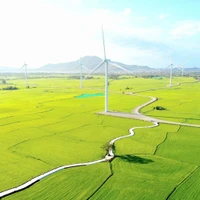
Dam Nai wind energy farm in Khanh Hoa province (Photo: VNA)
The Politburo has issued Resolution 70-NQ/TW, setting a long-term strategy for national energy security until 2030 with a vision to 2045. The landmark policy positions renewable and clean energy at the forefront, paves the way for a competitive electricity market, and aims to draw investment from all social sources.
A policy turning point
According to Le My Nga, former Project Director at the World Energy Council in Vietnam, the resolution represents a decisive turning point that will help safeguard energy security in the new era. It outlines an ecosystem-wide vision – from traditional to renewable and clean energy, and from conventional to advanced technologies such as hydrogen, green ammonia, and small modular nuclear reactors (SMRs).
Significantly, Resolution 70-NQ/TW emphasises the equal role of the private sector, encouraging deeper engagement from both domestic and foreign enterprises. Experts said the resolution paves the way for Vietnam to move from a model of “shortage and concern” to “proactivity and sustainable growth,” making energy a true pillar of long-term socio-economic development.
The new resolution also represents an advance as compared to the Politburo’s Resolution No. 55-NQ/TW in 2020, which laid out Vietnam’s national energy development strategy but left challenges unresolved, including electricity shortages, stalled nuclear power planning, incomplete market reforms, and cross-subsidisation in electricity pricing.
Nguyen Anh Tuan, General Director of Vietnam Electricity (EVN), said Resolution 70-NQ/TW opens a new chapter in energy security and provides the foundation for EVN’s action plans, including the adoption of a two-part electricity pricing. He stressed that the resolution represents a decisive institutional reform, removing key bottlenecks to accelerate the restructuring of Vietnam’s power sector toward a competitive market. It reinforces equality and non-discrimination, creating greater opportunities for the private sector's participation in the electricity supply and service chain, while ensuring consumers can freely choose providers—an essential step toward a truly competitive electricity market.
Boosting private investment
Resolution 70-NQ/TW aims to unlock the competitive power market and attract private investment. Nga noted that market reform and the private sector's participation are both urgent and necessary, with the resolution affirming equality and non-discrimination to create opportunities for enterprises at every stage of the supply chain. It also positions Vietnamese companies to move from participants to leaders in certain energy technologies.
The resolution also calls for the early implementation of direct power purchase agreements (DPPA) between generators and large customers, along with transparent, long-term contracts to protect investors' interests.
This marks a major step forward, but attracting private investment requires balancing the interests of investors, consumers, and the State.
Energy experts believed Resolution 70-NQ/TW maximises opportunities for the private sector's investment, but investors prioritise profit and low risk. The resolution addresses this by streamlining administrative procedures and cutting processing time by 30–50%, sending a strong signal to reduce risks and build investor confidence.
To build a modern, smart and sustainable energy ecosystem, experts stressed the need to quickly remove legal and planning bottlenecks. Clear and consistent policies are the key to investor confidence, alongside a unified legal framework, fair treatment of enterprises, financial incentives for green projects, and the development of high-quality human resources.
As Vietnam deepens global integration, Resolution 70-NQ/TW provides a timely framework to ensure energy security, promote sustainable development and strengthen the country’s position in the global energy value chain. If effectively implemented, it could become a key driver of national prosperity in the decades to come./.
VNA
Share